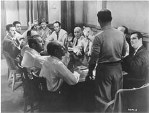Malcolm Gladwell and Legal Scholarship
 Gordon Smith and Orin Kerr have interesting posts up about their respective writing processes. I’m struck by the parallels with the two types of creativity – conceptual and experimental – that Malcolm Gladwell (pictured to the left) discusses in his latest New Yorker piece (which in turn draws on the work of David Galenson). As the distinction is explained on Galenson’s web site: “Experimental innovators work by trial and error, and arrive at their major contributions gradually, late in life. In contrast, conceptual innovators make sudden breakthroughs by formulating new ideas, usually at an early age.” The latter, one imagines, write law review articles before doing the research. The former go through lots of research, and lots of drafts, before arriving at a final product.
Gordon Smith and Orin Kerr have interesting posts up about their respective writing processes. I’m struck by the parallels with the two types of creativity – conceptual and experimental – that Malcolm Gladwell (pictured to the left) discusses in his latest New Yorker piece (which in turn draws on the work of David Galenson). As the distinction is explained on Galenson’s web site: “Experimental innovators work by trial and error, and arrive at their major contributions gradually, late in life. In contrast, conceptual innovators make sudden breakthroughs by formulating new ideas, usually at an early age.” The latter, one imagines, write law review articles before doing the research. The former go through lots of research, and lots of drafts, before arriving at a final product.
I’ve found that I tend toward the experimental. For my first article, I thought I had a good sense, when I started, of where it was headed. It turned out okay, but in retrospect I think I was a little too much the captive of my opening idea. Over time I’ve become more comfortable with the notion that I will, at the outset, have almost no idea where an article is headed. I pick a topic and ask myself, in effect, “what’s up with that?” I have some preliminary thoughts, of course, but find that the immersion that comes through research reveals interesting angles that I hadn’t anticipated. There’s a cumulative effect as well. Having been at the same family of topics for six-plus years, I feel like I’ve acquired not only a greater base of knowledge, but also a better sense of how to go about immersing myself in the research process. (Cue the comments about the value of a Ph.D.)
If nothing else, Gladwell’s essay (and Galenson’s research) gives me reason to keep plugging away. There may or (much more likely) may not be a major contribution lurking within. The only way for a fellow like me to find out is to keep at it.
Cross posted at PrawfsBlawg.

